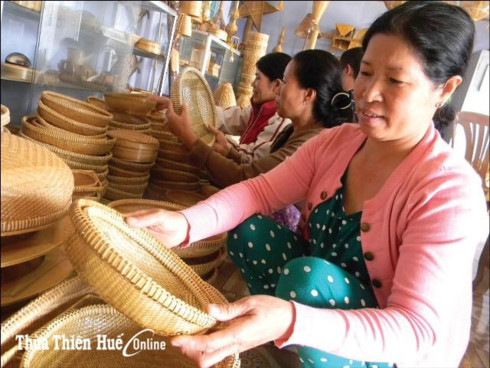Microfinance - an effective tool for women to escape poverty
Microfinance, which provides preferential micro-credits with simple conditions, is seen as an effective tool to help women beat poverty, develop business and make contributions to the society.
According to Bui Thuy Hang from the State Bank of Vietnam’s Monetary Policy Department, impoverished women are important customers of micro-credit products as they are positive savers and debt payment rate among women is higher than men.
Vietnam now has more than 100 organisations offering microfinance services, including three official organisations of Vietnam Bank for Social Policies (VBSP), the People’s Credit Fund, and Vietnam Bank for Agriculture and Rural Development, and semi-official ones like domestic and international non-governmental organisations, the Vietnam Women’s Union, Vietnam Farmer’s Union, and War Veteran Association.
 |
| Microfinance is seen as an effective tool to help women beat poverty. (Photo: baothuathienhue.vn) |
Last year, the VBSP gave more than VND55.9 trillion (US$2.4 billion) in preferential loans to 2,120 poor and near-poor households, and many other policy beneficiaries. Microfinance showed its efficiency in poverty elimination efforts as the poverty rate in the country decreased from 58% in 1993 to some 6.72% by the end of 2017.
On December 6, 2011, the Prime Minister signed Decision No.2195/QD-TTg on “Approving a project on developing microfinance in Vietnam until 2020”, with major solutions such as building rational legal environment, improving capacity of microfinance organisations, and raising public awareness of microfinance.
The country is also completing a legal corridor for microfinance activities.
However, the shortage of capital remains the most tremendous challenge to the micro-credit programmes. Deposits at the VBSP only meet 5% of lending demand, thus, most of the capital depends on State budget or the State’s mobilised capital.
In addotion, high management costs are also hindering organisations offering micro-finance services.
Tran Thi Minh Huong from the National University of Economics said that the Government needs to draw up policies to encourage financial and credit institutions to invest in microfinance organisations in the role of strategic shareholders. She also suggested higher loan and deposit interest rates than regulated to ensure that microfinance organisations can mobilise capital for stable operation.

